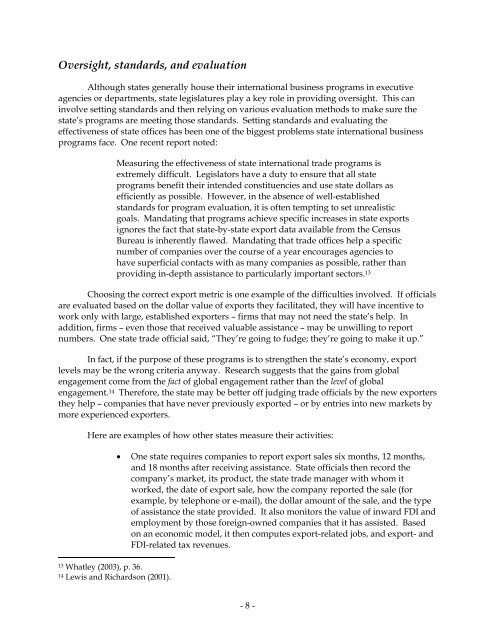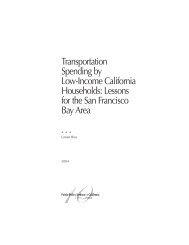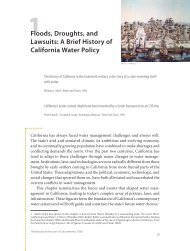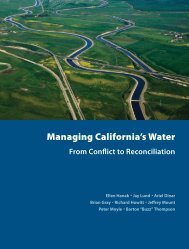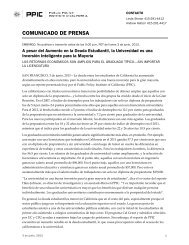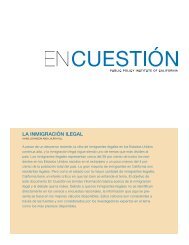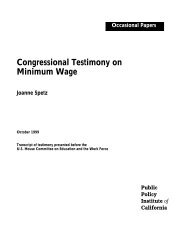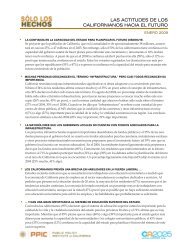Occasional Paper Title - Public Policy Institute of California
Occasional Paper Title - Public Policy Institute of California
Occasional Paper Title - Public Policy Institute of California
Create successful ePaper yourself
Turn your PDF publications into a flip-book with our unique Google optimized e-Paper software.
Oversight, standards, and evaluation<br />
Although states generally house their international business programs in executive<br />
agencies or departments, state legislatures play a key role in providing oversight. This can<br />
involve setting standards and then relying on various evaluation methods to make sure the<br />
state’s programs are meeting those standards. Setting standards and evaluating the<br />
effectiveness <strong>of</strong> state <strong>of</strong>fices has been one <strong>of</strong> the biggest problems state international business<br />
programs face. One recent report noted:<br />
Measuring the effectiveness <strong>of</strong> state international trade programs is<br />
extremely difficult. Legislators have a duty to ensure that all state<br />
programs benefit their intended constituencies and use state dollars as<br />
efficiently as possible. However, in the absence <strong>of</strong> well-established<br />
standards for program evaluation, it is <strong>of</strong>ten tempting to set unrealistic<br />
goals. Mandating that programs achieve specific increases in state exports<br />
ignores the fact that state-by-state export data available from the Census<br />
Bureau is inherently flawed. Mandating that trade <strong>of</strong>fices help a specific<br />
number <strong>of</strong> companies over the course <strong>of</strong> a year encourages agencies to<br />
have superficial contacts with as many companies as possible, rather than<br />
providing in-depth assistance to particularly important sectors. 13<br />
Choosing the correct export metric is one example <strong>of</strong> the difficulties involved. If <strong>of</strong>ficials<br />
are evaluated based on the dollar value <strong>of</strong> exports they facilitated, they will have incentive to<br />
work only with large, established exporters – firms that may not need the state’s help. In<br />
addition, firms – even those that received valuable assistance – may be unwilling to report<br />
numbers. One state trade <strong>of</strong>ficial said, “They’re going to fudge; they’re going to make it up.”<br />
In fact, if the purpose <strong>of</strong> these programs is to strengthen the state’s economy, export<br />
levels may be the wrong criteria anyway. Research suggests that the gains from global<br />
engagement come from the fact <strong>of</strong> global engagement rather than the level <strong>of</strong> global<br />
engagement. 14 Therefore, the state may be better <strong>of</strong>f judging trade <strong>of</strong>ficials by the new exporters<br />
they help – companies that have never previously exported – or by entries into new markets by<br />
more experienced exporters.<br />
Here are examples <strong>of</strong> how other states measure their activities:<br />
13 Whatley (2003), p. 36.<br />
14 Lewis and Richardson (2001).<br />
• One state requires companies to report export sales six months, 12 months,<br />
and 18 months after receiving assistance. State <strong>of</strong>ficials then record the<br />
company’s market, its product, the state trade manager with whom it<br />
worked, the date <strong>of</strong> export sale, how the company reported the sale (for<br />
example, by telephone or e-mail), the dollar amount <strong>of</strong> the sale, and the type<br />
<strong>of</strong> assistance the state provided. It also monitors the value <strong>of</strong> inward FDI and<br />
employment by those foreign-owned companies that it has assisted. Based<br />
on an economic model, it then computes export-related jobs, and export- and<br />
FDI-related tax revenues.<br />
- 8 -


